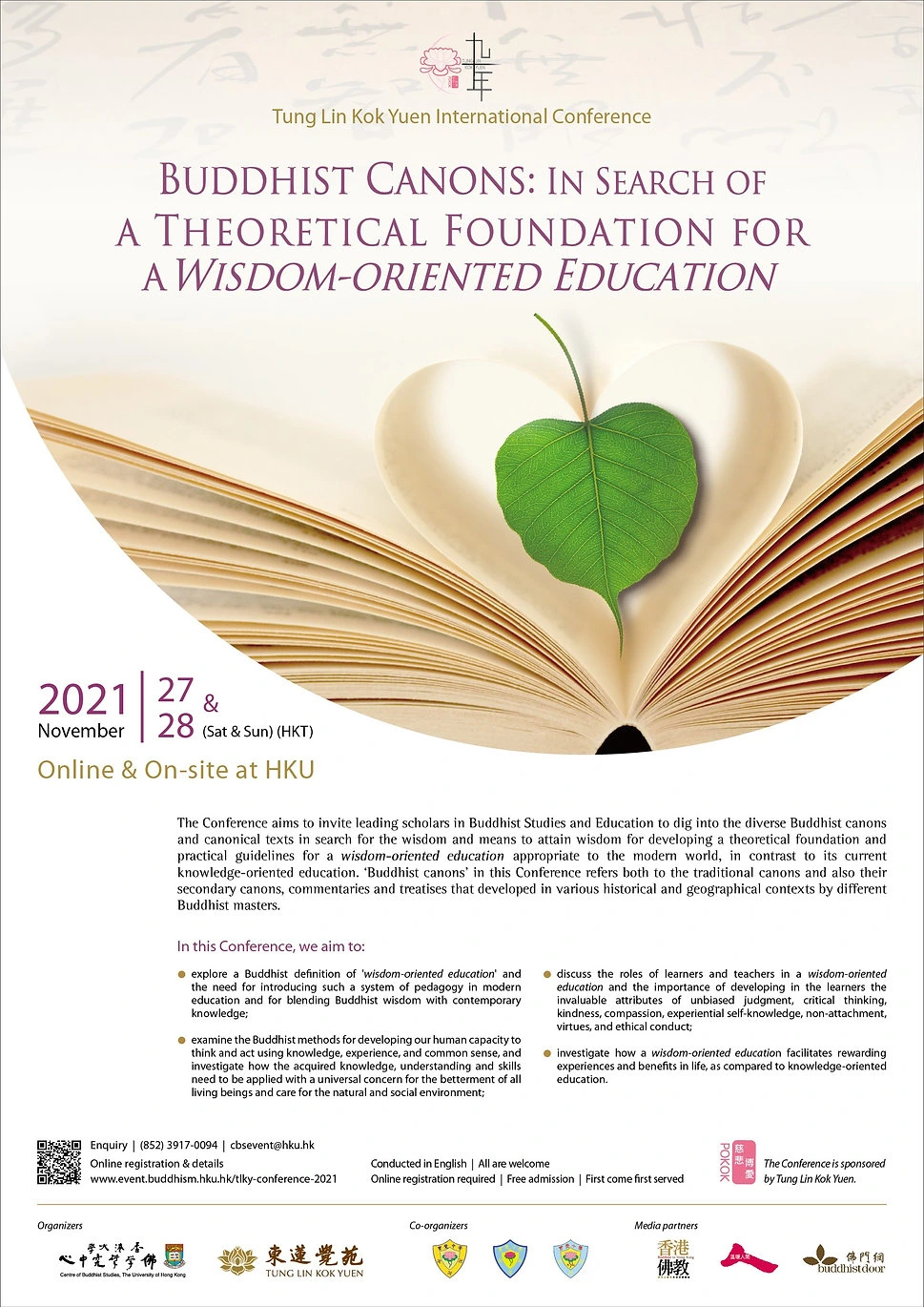
Professor Jiang Wu and Professor Albert Welter will present papers at the upcoming Tung Lin Kok Yuen International Conference: Buddhist Canons: In Search of a Theoretical Foundation for a Wisdom-oriented Education, Nov. 27 - Nov. 28, 2021 in Hong Kong.
Leading scholars in Buddhist Studies and Education will dig into the diverse Buddhist canons and canonical texts to develop a theoretical foundation and practical guidelines for a wisdom-oriented approach to education appropriate to the modern world, in contrast with its current knowledge-oriented education. “Buddhist canons” in this conference refers both to the traditional canons and also their secondary canons, commentaries and treatises that developed in various historical and geographical contexts by different Buddhist masters.
Conference talks will be broadcast on Zoom and Youtube. For more information, please visit: https://www.event.buddhism.hku.hk/tlky-conference-2021.
Please verify the times in your area via a time zone calculator as Arizona does not observe Daylight Savings Time.
Title: Opening the Canon: New Challenges to Buddhist Studies in Humanities Education
Speaker: Prof. Jiang Wu, director of the Center of Buddhist Studies and professor in the Department of East Asian Studies at the University of Arizona
Date: Saturday, Nov. 27, 8:00 pm - 8:45 pm Arizona Standard Time, Sunday, Nov. 28, 11:00 - 11:45 am Hong Kong Time
Description: The canon is a loaded term in both the East and the West. Under the purview of the postmodern critical theory, the canon, including the Buddhist canon, represents an oppressive and authoritative force, exerting its symbolic influence on all aspects of human life. However, such a view neglects the fact that the canon is also evolving and responding to changes. The Buddhist canon, in particular, has been part of the communities since its beginning. In contrast to the Western canon, it is always open to new additions and interpretations. In a digital age, the Buddhist canon has been more widely distributed as both an academic subject for studies and a tool of self-cultivation in humanities education. Yet, because of its complexity, the canon is far from open. There is an urgent need for us to open the canon, to familiarize ourselves with its content, history, and to experience its transformation in real life. This talk attempts to open the Buddhist canon from the perspective of humanities education and explore its humanistic value in a post-pandemic global society.
***
Title: Retrieving the Dharma Wheel: Searching for Meaning in the Sino-East Asian Buddhist Canon
Speaker: Albert Welter, professor and head in the Department of East Asian Studies at the University of Arizona
Date: Saturday, Nov. 27, 7:00 pm - 7:45 pm (Arizona Standard Time), Sunday, Nov. 28, 10:00 - 10:45 am Hong Kong Time
Description: How should we understand the Buddhist canon? How do we access the wisdom contained in it? The contemporary need addressed in the theme of this conference, Buddhist Canons: In Search of a Theoretical Foundation for a Wisdom-oriented Education, underscores an ongoing struggle to come to terms with the density and complexity of the Buddhist canon. For those with sufficient means, printing the canon resulted in a welcome display of merit, a gift of unequal value. But what of the value of its contents to “end users,” those who actually read and apply its varied messages? For most practitioners, the Buddhist canon represents a massive corpus, impressive in size, but otherwise unwieldy for practical application. Because of its enormity, the Buddhist faithful looked to creative ways to manage and use the canon’s contents in keeping with their own religious and spiritual aspirations. My presentation consists of two parts. The first part explores ways in which Sino-East Asian Buddhist communities strove to make sense of the massive corpus the Buddhist canon represented, to review the strategies used to reduce the density and complexity of the canon to a manageable form. These attempts to form “windows into wisdom” that the canon contain may serve two purposes: (1) they act as repositories for how the canon is currently approached, as the legacies of past attempts are still very much with us, and (2) they help inform contemporary attempts to formulate new approaches––previous examples on how to access Buddhist wisdom may help us devise new approaches suitable to our present circumstances. The second part of my presentation contextualizes the attempt to formulate Buddhist orientations toward wisdom in the global present, the modern and contemporary world. Here, again, I review the historical record of intellectual developments in the Sino-East Asian Buddhist world to explore how Buddhist transmissions and innovations kept Buddhist wisdom traditions alive and prospering. What lessons does this record reveal on how to nurture and articulate a Buddhist wisdom in the global present that seems to have settled on a Protestant Buddhist fundamentalism privileging the historical Buddha and Pali canon.

